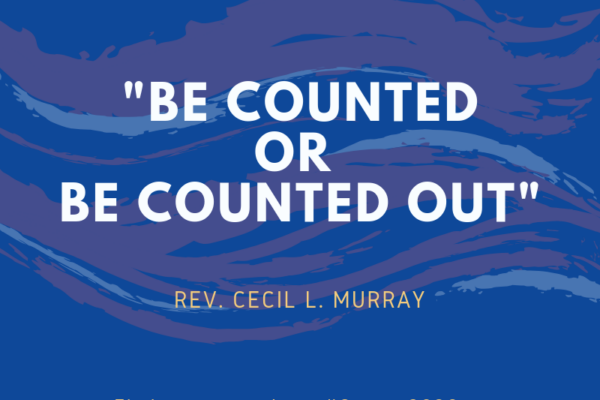What is the census?
The census is a counting of all residents in the United States. Our constitution mandates that we do a census every 10 years, and that it be used for two purposes:
- The census determines how many seats each state has in the House of Representatives.
- It also determines how to distribute federal funds to localities.
Why should I participate in the census?
If you want your community to receive its fair share of funding and representation, then you should fill out the census form and turn it in. This includes funds for schools, hospitals, fire departments, roads, public assistance and so on. With neighborhoods changing rapidly, it’s important that EVERYBODY gets counted.
According to the Advancement Project, 9.6 million Californians live in hard-to-count census tracts, including 2.5 million children under age 5. That means California is at risk of being undercounted in 2020, affecting funding and representation for the next 10 years.
How can I get involved?
UPDATE Feb 2020: Watch this video about the timeline for promoting the Census:
The USC Cecil Murray Center for Community Engagement is working on the census as part of a larger effort to ensure that Los Angeles is counted accurately. The Murray Center is hosting roundtables with faith leaders and community events to spread information about census participation. We are also recruiting social media ambassadors to help spread the word. To find out more, contact Rev. Najuma Smith-Pollard: damalism@usc.edu and sign up for our newsletter: http://bit.ly/crcc-list.
You can also follow us on social media (we’re on Twitter and Facebook) to find out about upcoming events.
The Murray Center developed a social media toolkit with sample posts and graphics for use by all.
There are also jobs available! You can find more information about Census jobs here: https://www.census.gov/about/regions/los-angeles/jobs/all.html.
Who gets counted in the census?
Anybody who is living in your household on April 1, 2020 should be counted on your census form. You can find out more about specific types of people–such as children and students, visitors, foreign citizens, people in prison–here:
https://2020census.gov/en/who-to-count.html
What about people experiencing homelessness?
Visitors who live and sleep in somebody else’s home most of the time should be counted there.
The Census Bureau seeks to count people who are living in shelters, outside, in tents, cars or RVs at service locations and pre-identified outdoor locations. These counts take place for multiple days. For more information, click here.
When is the census?
Census Day is April 1, 2020.
By this date, you will have received an invitation to participate. You should fill out the form based on where you live–and who lives with you–on April 1.
What if you forget on April 1? You can still fill out the form! Census workers will be following up with households through May, but complete the census form and send it in as soon as possible.
How is the census information collected?
NEW! In 2020, the census form will be collected online for the first time.
You will still be able to fill out the paper form and return it by mail, or respond by phone.
Here’s more (and sign up for an email reminder): https://2020census.gov/en/ways-to-respond.html.
Will the census ask about my citizenship?
Breaking news on June 27: The Supreme Court did NOT approve a question about citizenship being added to the 2020 census. The court sent the matter back to a lower court for review. The Census Bureau had a deadline of July 1 for printing the survey. It seems unlikely that the administration will be able to argue for the questions’ addition in time.
Background: The Trump administration wanted to add a question about citizenship to the census form. Many states and organizations fought the inclusion of that question, because the census is supposed to count all RESIDENTS, not citizens. The citizenship question would have discouraged people from participating, resulting in an undercount.
The Supreme Court found that the administration did not provide a good reason for asking about citizenship. New evidence shows that a Republican strategist recommended the addition of such a question to give Republicans an advantage over Democrats in elections.
It is important to dispel myths and fears around census participation. California is undertaking a large effort to ensure that everyone is counted. This is critical so that the state gets the resources and representation that it deserves.
Can the government share my information with other agencies (immigration, law enforcement)?
No, it cannot share your information.
Federal law bans the Census Bureau from sharing personal information reported on the census with other federal agencies. They cannot share personal information with immigration enforcement, police departments or the justice system, child services, the IRS or other agencies.
Because many people are unaware that their privacy is protected in this way, individuals may feel inclined to report inaccurately, which brings up an issue with the census at large: self-report bias.
“One important concern is how the census data will be used, and there is often a question of whether the Census Bureau shares information with law enforcement agencies like the FBI, ICE or even the local police. I assure you that this does not happen and it is prohibited by Title 13. Title 13 makes it very clear that the data we collect can only be used for statistical purposes and cannot be shared for nonstatistical purposes — including law enforcement. The Census Bureau is proud of this law and we are committed to ensuring that the data we collect are always protected. We do not share confidential micro data (i.e., data at the individual, household or business level) with any party for non statistical purposes.”
–Dr. Ron Jarmin in “The U.S. Census Bureau’s Commitment to Confidentiality”
What does the Christian faith have to say about participating in the census?
For many Christians, participating in the Census is about more than simply fulfilling one’s civic duty. Being counted in the Census reflects obedience to a much higher power than government–namely, God. Censuses are chronicled in both the New Testament and the Old Testament (Hebrew Bible); for this reason, members of the faith community see their participation in the census as undertaking spiritual work that connects them to an ancient lineage of belief and practice.
The Book of Numbers records two censuses of the Israelite people: one at the beginning of the 40-year wilderness experience, after the community escapes captivity and flees Egypt, and one at the end of that period of wandering. The population counted in the census of Numbers 1:1-3 was 603,550. The later census (Numbers 26:1-4) recorded a population of 601,730.
Near the end of his reign, King David asked his military leaders to conduct a census of the tribes of Israel, which was recorded in 2 Samuel 24:1-2. In 2 Chronicles 2:17-18, Solomon took a census of the foreigners in the land for the purpose of distributing laborers. Finally, during the time of Nehemiah, a complete census of the people was recorded in Ezra 2.
Mentions of two Roman censuses are found in the New Testament. The most well-known, of course, took place at the time of Jesus Christ’s birth, reported in Luke 2:1–5. And the final census mentioned in the Bible was also recorded by Luke, in the book of Acts 5:37.
Rev. Najuma Smith is Assistant Director of Community and Public Engagement with the USC Center for Religion and Civic Culture.






